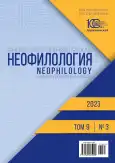Fake news dissemination technologies in mass media and ways of their verification: linguistic aspect
- Authors: Guskova S.V.1, Shesterina A.M.2
-
Affiliations:
- Derzhavin Tambov State University
- Lomonosov Moscow State University
- Issue: Vol 9, No 3 (2023)
- Pages: 618-629
- Section: MEDIA COMMUNICATIONS AND JOURNALISM
- URL: https://journal-vniispk.ru/2587-6953/article/view/295736
- DOI: https://doi.org/10.20310/2587-6953-2023-9-3-618-629
- ID: 295736
Cite item
Full Text
Abstract
Availability of means and channels of communication in the 2020s for the general population has significantly influenced the processes of production and transmission of information. Each event that is relevant, albeit for a limited circle of people, becomes known momentarily and can be broadcast to unlimited territories. Such possibilities of communication channels have actualized the problem of spreading unreliable, fake information, since its creators understand the effectiveness of textual information on the audience, first of all. The need to resist the dominance of fake information is recognized at the state level. In recent years, the current legislation has been tightened; the purpose of the innovations is to suppress attempts to spread fakes and punish if facts of their publication in the media are revealed, in particular, in cases where deliberately false information is disseminated containing data on the use of the Armed Forces of the Russian Federation in order to protect the interests of the state and its citizens, maintain international peace and security. Interest in the facts of the dissemination of false information by the scientific community is intensified; thus, a lot of scientific and popular science works devoted to this issue are found, thematic conferences are held on this topic. Do not stand aside the media, which report on the facts broadcast on other channels of fake news. As a result, a lot of materials are published about the disclosure of the facts of the publication of fakes. However, updating the problem at different levels is not enough, it is important to consolidate the efforts of society in countering the dominance of fakes in the media. Moreover, it is required to communicate the proven methods for conducting fact-checking to the most vulnerable – children and youth audiences, to develop their skills in recognizing reliable and false information.
About the authors
S. V. Guskova
Derzhavin Tambov State University
Email: guskova_s_v@mail.ru
ORCID iD: 0000-0001-6163-403X
PhD (Philology), Associate Professor of Journalism, Advertising and Public Relations Department
33 Internatsionalnaya St., Tambov, 392000, Russian FederationA. M. Shesterina
Lomonosov Moscow State University
Author for correspondence.
Email: shesterina8@gmail.ru
ORCID iD: 0000-0001-7270-2376
Dr. habil. (Philology), Professor, Professor of Journalism of the Higher School (Faculty) of Television Department
1 Leninskie Gory, Moscow, 119991, Russian FederationReferences
- Zuikina K.L., Sokolova D.V. Content specifics of Russian fake news on the internet and on television. Vestnik Moskovskogo universiteta. Seriya 10: «Zhurnalistika» = Moscow University Bulletin. Series 10: Journalism, 2019, no. 4, pp. 3-22. (In Russ.) https://doi.org/10.30547/vestnik.journ.4.2019.322, https://elibrary.ru/xccerj
- Sternin I.A., Shesterina A.M. Markery feika v mediatekstakh [Fake Markers in Media Texts]. Voronezh, LLC “RITM Publ.”, 2021, 60 p. (In Russ.) https://elibrary.ru/koccfi
- Zolyan S.T., Probst N.A., Sladkevich Zh.R., Tul’chinskii G.L. Feiki: kommunikatsiya, smysly, otvetstvennost’ [Fake: Communication, Meanings, Responsibility]. St. Petersburg, Aleteiya Publ., 2021, 288 p. (In Russ.)
- Lutsenko E.P. Criminal liability for fakes under the current criminal legislation. Pravo i upravlenie = Law and Administration, 2022, no. 10, pp. 145-149. (In Russ.) https://doi.org/10.24412/2224-9125-2022-10-145-149, https://elibrary.ru/mwxbxk
- Poshelov P.V. Novelties of the criminal code of the Russian Federation on fakes and defamation of the armed forces of the Russian Federation. Voenno-yuridicheskii zhurnal = Military-Law Journal, 2022, no. 4, pp. 11-13. (In Russ.) https://doi.org/10.18572/2070-2108-2022-4-11-13, https://elibrary.ru/hfxlkn
- Igoshina M.A. Faktcheking kak sposob bor’by s feikami v setevykh media [Fact-checking as a way to combat fakes in online media]. Studencheskaya nauka i XXI vek [Student Science and the 21st Century], 2020, vol. 17, no. 2-2 (20), pp. 46-48. (In Russ.) https://elibrary.ru/ikyygo
- Ivanishcheva O.N. Fakes as a kind of social information. Chelovek. Kul’tura. Obrazovanie = Human. Culture. Education, 2020, no. 1 (35), pp. 63-73. (In Russ.) https://doi.org/10.34130/2233-1277-2020-1-63-73, https://elibrary.ru/nqflfz
- Mal’kov S.M. Fakes as an act against the military service and criminal law combating thereof. Voenno-yuridicheskii zhurnal = Military-Law Journal, 2023, no. 1, pp. 27-31. (In Russ.) https://doi.org/10.18572/2070-2108-2023-1-27-31, https://elibrary.ru/njutjh
- Sabir’yanova A.R. Priroda poyavleniya feikov v sovremennykh SMI [The nature of the appearance of fakes in modern media]. Studencheskaya nauka i XXI vek [Student Science and the 21st Century], 2020, vol. 17, no. 2-2 (20), pp. 91-93. (In Russ.) https://elibrary.ru/woggxc
- Mal’kevich A.A. Information war of the 21st century: faking factories, centers of power and information militia. Rossiiskaya shkola svyazei s obshchestvennost’yu = Russian School of Public Relations, 2022, no. 25, pp. 156-171. (In Russ.) https://elibrary.ru/senqtz
- Svechnikov S.S. Feiki kak instrument informatsionno-psikhologicheskogo vozdeistviya v propagande (na pri-mere konflikta Rossii i Ukrainy) [Fake news as a tool of information and psychological influence in propaganda (on the example of the conflict between Russia and Ukraine)]. Studencheskaya nauka i XXI vek [Student Science and the 21st Century], 2022, vol. 19, no. 1-2 (22), pp. 265-266. (In Russ.) https://elibrary.ru/hpfnet
- Archakova M.A. “Fakes” and memes of COVID-19: inappropriate laughter therapy or healing optimism? Kom-munikologiya: elektronnyi nauchnyi zhurnal = Communicology: Online Scientific Journal, 2020, vol. 5, no. 4, pp. 61-68. (In Russ.) https://elibrary.ru/hepruw
Supplementary files









